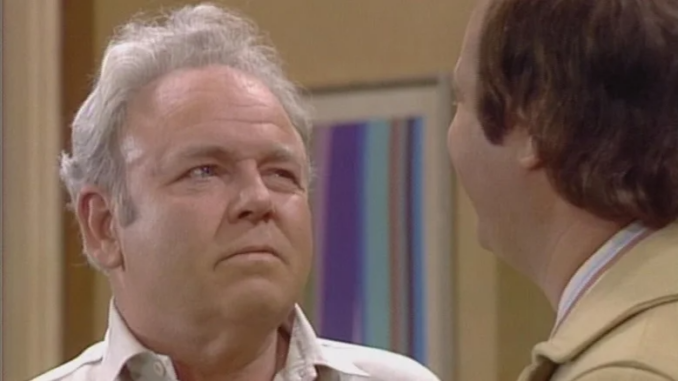
Movies and television have often had a push-pull relationship. When brands and intellectual properties became king near the start of the 21st century, TV became the place to go for creatives who wanted to tell bold and original stories to a mainstream audience. In contrast, the social revolutions of the 1960s saw networks burying their heads in the sand, serving up a buffet of conservative-leaning sitcoms where just about everybody was white, straight, and Christian, nobody had sex or cursed, and things like the Civil Rights Movement or the Vietnam War might as well be happening on Neptune. Meanwhile, the pictures swung in the opposite direction; the rise of New Hollywood meant that the escapist studio fare of yore was no longer fashionable (with films like “The Sound of Music” becoming the exception, not the rule).
It was in this climate that Norman Lear came up with the idea for “All in the Family,” inspired by the British dramedy series “Till Death Do Us Part” (which premiered in 1965). Lear saw himself and his family in the show’s characters: a clan of Londoners whose ranks included a bigoted, anti-socialist patriarch who practically lived to insult his wife — who would lob cutting remarks right back at him — and butt heads with his progressive son-in-law and long-suffering daughter. Much like the U.S. version of “The Office” in its first season decades later, the “All in the Family” pilot that CBS aired on January 12, 1971, was almost a photocopy of its British counterpart, save for the changes in nationality. Before long, though, it found its own groove, birthing a long-running hit and, with time, an entire universe of spinoffs for the network.
Things might’ve gone quite differently, though, had ABC not spent literal hundreds of thousands to dollars to avoid airing an earlier iteration of the pilot.
Legend has it the first two attempts at the “All in the Family” pilot, titled “Justice for All” and “Those Were the Days,” didn’t work due to the casting (and you know how the saying about legend and fact goes from “The Man Who Shot Liberty Valance”). However, while there is surely more than a grain of truth to this notion, that’s not what Lear is quoted as saying in LIFE’s 2021 single-issue magazine “All In The Family: TV’s Groundbreaking Comedy.” According to the late writer/producer, the studio audience “roared with laughter” watching “Those Were the Days,” but ABC declined to air the episode despite having already spent $250,000 making it. “It wasn’t a question of whether it was funny or not,” Lear claimed. “They peed in their pants. But they were afraid.”
CBS was comically skittish about the whole thing, too, and threw on a long-winded disclaimer at the start of its reconfigured “All in the Family” pilot, “Meet the Bunkers,” just in case its gamble didn’t pay off. After all, lighthearted, cheery larks like “The Andy Griffith Show,” “Gilligan’s Island,” “Petticoat Junction,” and “Mister Ed” ruled the network’s airwaves in the ’60s. The furthest CBS had strayed from “safe” sitcom depictions of modern Americans was probably “The Munsters” … and last I checked, Herman Munster wasn’t fond of casually using discriminatory terminology or giving his relatives rude nicknames like “Dingbat” and “Meathead,” unlike “All in the Family” pater familias Archie Bunker.

To tell the truth, “The Munsters” was wryly tuned into the sociopolitical concerns of its day, using Universal monster archetypes as a metaphor for marginalized and “othered” groups. “All in the Family” just proved that television viewers were ready to do away with the conceits altogether, much like those flocking to the films of the American New Wave in theaters. ABC’s loss was CBS’ gain.
